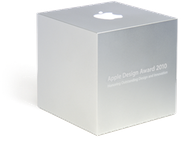
The Apple Design Awards, which recognize the best software created by third-party developers for Apple platforms, are among the most coveted honors in the Mac community and developers weren't shy about voicing their disappointment over the lack of Mac.Third-party developers heaved a sigh of relief this morning as Apple finally announced the dates for its 2010 Worldwide Developer Conference. But that sigh was quickly followed by a raised eyebrow of curiosity as they noticed that Apple had dropped the Mac software category from its long-running Apple Design Awards. Instead, the awards will cover only iPhone and iPad applications available on the App Store.
"I think it's a mistake for Apple to miss such an easy opportunity to acknowledge Mac developers," says Red Sweater Software proprietor Daniel Jalkut. "While the iPhone and iPad are understandably hot right now, the Mac is still a huge part of Apple's business, and Mac developers are important in sustaining that."
Rogue Amoeba CEO Paul Kafasis agrees. "Ultimately, I find these moves disappointing. Having an iPhone slant at WWDC is one thing, but completely cutting the Mac out of the ADAs? That feels like a snub to plenty of Mac developers who continue to do great work on a well-established, popular platform."
While ADAs are handed out every year at WWDC, the list of categories change to take into account Apple's latest technologies. In 2005, for example, Apple recognized "Best Mac OS X Tiger Technology Adoption"; in 2006, "Best Automator Workflow." iPhone apps were first given awards in 2008, a month before the App Store's debut. But while iPhone and iPad apps are clearly the topic of the moment in 2010, it would also have been the first year for showing off apps that take advantage of features in the latest version of Mac OS X, Snow Leopard, which debuted last August.
The ADAs aren't the only place that the Mac seems to have gotten short shrift. Apple's dubbed WWDC 2010 "the center of the app universe" and the list of sessions reference "how to harness the revolutionary technologies in iPhone OS."
Apple's also reorganized the conference's structure, which in the past has been divided up into tracks for the company's various platforms and other general topics: iPhone, Mac, IT, and so on. This year, Apple's taken a technology-centric approach, dividing its session up into topics on Application Frameworks, Core OS, Developer Tools, Graphics & Media, and Internet & Web.
Given that Apple has already shown off iPhone OS 4.0, which is due to be released this summer, it's not necessarily a surprise that the bulk of WWDC would focus on iPhone development. The next version of the Mac OS X, on the other hand, hasn't yet seen the light of day, and some estimate that it's still a year or more away.
"This year, because of their focus on iPhone and iPad, there isn't anything exciting to sell about Mac OS X," says Red Sweater's Jalkut.
"I don't think we'll see any information Mac OS X 10.7 at all," says Kafasis. "Apple clearly wants to focus on iPhone OS."
There's also the recent introduction of the iPad, which is undeniably a hot property at the moment. It also means that half of Apple's major product lines—the Mac, iPod, iPhone, and iPad—run the iPhone OS. And the iPhone alone makes up a major portion of the Apple's revenue; last quarter, it accounted for 40 percent of the company's $13.5 billion income.
Mac OS X isn't wholly absent from the 2010 proceedings. There are several WWDC sessions that deal specifically with the Mac, such as "I/O Kit Device Drivers for Mac OS X," and "OpenGL for Mac OS X," and several of the other session descriptions put the Mac on even footing with the iPhone OS. And of course, since the Mac and iPhone operating systems share an underlying foundation, many of the sessions apply to both platforms.
But the shift towards the iPhone is undeniable, and when coupled with other recent concerns, such asthe lack of updates to Apple's popular Mac OS X Downloads page, some developers are uncomfortable with the message that Apple seems to be sending. "Is that intentional, or are we reading too much into it?" wonders Kafasis. "It's impossible to say, but it's all we have to go off of for now."
That said, Kafasis doesn't find the move surprising, given Apple's sometimes tumultous—and often close-mouthed—relationshp with third-party developers. "At times, they've needed us—to help keep the company afloat in the late '90s, to get people to try Mac OS X (and leave Mac OS 9), to move people to Intel from [PowerPC]. But when they don't need us, it often feels as though they don't really want us either. I think that in the mind of Steve Jobs, the Mac is largely complete, without any third party applications."
Despite the shift in focus, Mac developers seem more irked than worried for the future of their platform. After all, Mac sales have been steadily growing over the last several years, with 2.94 million computers sold in the last quarter and repeated record-setting Mac sales.
"The iPhone OS is certainly bigger than Mac OS X now, and that's incredible," Kafasis says. "That doesn't mean the Mac is suddenly irrelevant, however."
"It's not the end of the Mac, or even indicative that Apple doesn't care about supporting Mac developers," adds Jalkut. "Apple just gets this annoying tunnel vision sometimes and this is a perfect example of that."
No comments:
Post a Comment